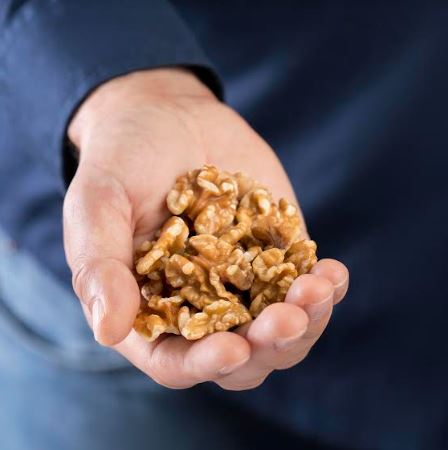|
Amid hectic work schedules, tentative vacay plans, and the never-ending to-do list that’s lingering on us, you’d agree that we are all doing the best we can to live the fullest and stay fit in our small but unique way. And days like, June 21, which is celebrated every year as International Yoga Day, act as a gentle reminder to embrace health and wellness. According to the Ministry of AYUSH, yoga is key to improving flexibility, strength, balance, and attaining harmony. And its popularity across the globe is proof enough.
Handful of Walnuts What is important to remember here, however, is the fact that this ancient practice alone can’t help you achieve your health and fitness goals. Yoga and a nutritious, balanced diet go hand in hand, and eating the right foods ensure your body gets the essential nutrients it requires for optimal health – not just body but also mind. “Adding a handful of walnuts to your daily diet can set you off to a great start and fuel your brain and body,” says Naaznin Husein, renowned Nutritionist, Yoga Consultant, and Founder of Freedom Wellness Management. She further explains, “By a handful, I mean approx. 28g of walnuts that contain 4g protein, 2g fiber, and 2.5g plant-based omega-3 ALA. All these beneficial nutrients are known to support the health of our heart, brain, and gut.” Did you know that California walnuts are produced under stringent quality controls that exceed California inspection standards, reputed to be the world’s toughest? It’s a long road from planting a walnut orchard to delivering fresh, delicious walnuts to our local markets. Not only this, these wonderful crunchy and mildly sweet wonder nuts, when added to our daily diet, can help in overall wellness, shows research: 1) Say hello to a healthy heart Loaded with good fats (plant-based omega-3 ALA), walnuts, as part of a nutritious and balanced diet, may decrease the risk of heart disease and stroke.1 They help maintain healthy cholesterol levels and decrease blood pressure, two of the major risk factors for heart disease.2,3 2) Focus on immunity Walnuts are a good source of plant-based vitamin B, zinc, and selenium – the trio that boasts of the potential to ensure normal functioning of our immune system as per FSSAI’s Eat Right during COVID-19 guidelines.4 3) Weight maintenance Most of us exercise to lose weight and get into the perfect shape. While walnuts may not make you shed those extra calories, they sure help along the way. Research shows walnuts’ potential role in influencing appetite hormones that make you feel full for longer. Which, in turn, avoids unnecessary cravings.5 4) Reduce the risk of diabetes One of India’s most common and concerning diseases is diabetes, especially type 2 diabetes. It has been discovered that walnuts, as part of a healthy diet, may help manage diabetes and metabolic syndrome. A study representing more than 34,000 American adults suggests those who consume walnuts may have about half the risk of developing type 2 diabetes, compared to adults who do not eat nuts.6 Here are some quick hacks Nutrition and Yoga expert, Naaznin Husein recommends to add walnuts into the daily diet regime: 1) Blend it into your pre-workout/post-workout smoothie to keep yourself energized. 2) Toss it into your salad or trail mix to transform them into an omega-3-rich meal/snack. 3) Add them to your curries and tikkas, and you can say goodbye to the cream for good. 4) Coat your meat and seafood with chopped walnuts for that extra crunch and nutrition quotient. 5) Indulge in a handful of walnuts to fix your mid-meal hunger pangs. References: 1Fleming JA, Kris-Etherton PM. The evidence for α-linolenic acid and cardiovascular disease benefits: comparisons with eicosapentaenoic acid and docosahexaenoic acid. AdvNutr. 2014;5(6):863S-76S. doi: 10.3945/an.114.005850. 21FDA approved claim: Supportive but not conclusive research shows that eating 1.5 ounces of walnuts per day, as part of a low saturated fat and low cholesterol diet, and not resulting in increased caloric intake, may reduce the risk of coronary heart disease. U.S. Food and Drug Administration, March 2004. One ounce of walnuts provides 18g of total fat, 2.5g of monounsaturated fat, 13g of polyunsaturated fat, including 2.5g of alpha-linolenic acid, the plant-based omega-3. 32Kris-Etherton P. Walnuts decrease risk of cardiovascular disease: a summary of efficacy and biologic mechanisms. J Nutr. 2014; 10: 39:2S-8S. 4fssai.gov.in/upload/uploadfiles/files/Guidance_Document_Eat_Right_07_06_2020.pdf 5Farr OM, Tuccinardi D, Upadhyay J, et al. Walnut consumption increases activation of the insula to highly desirable food cues: A randomized, double-blind, placebo-controlled, cross-over fMRI study. Diabetes ObesMetab. 2018;20(1):173-177. doi: 10.1111/dom.13060. 6Arab L, Dhaliwal SK, Martin CJ, et al. Association between walnut consumption and diabetes risk in NHANES. Diabetes Metab Res Rev. 2018;34(7):e3031. doi:10.1002/dmrr.3031. |
|
(Disclaimer: The above press release comes to you under an arrangement with NewsVoir India and this publication takes no editorial responsibility for the same)





